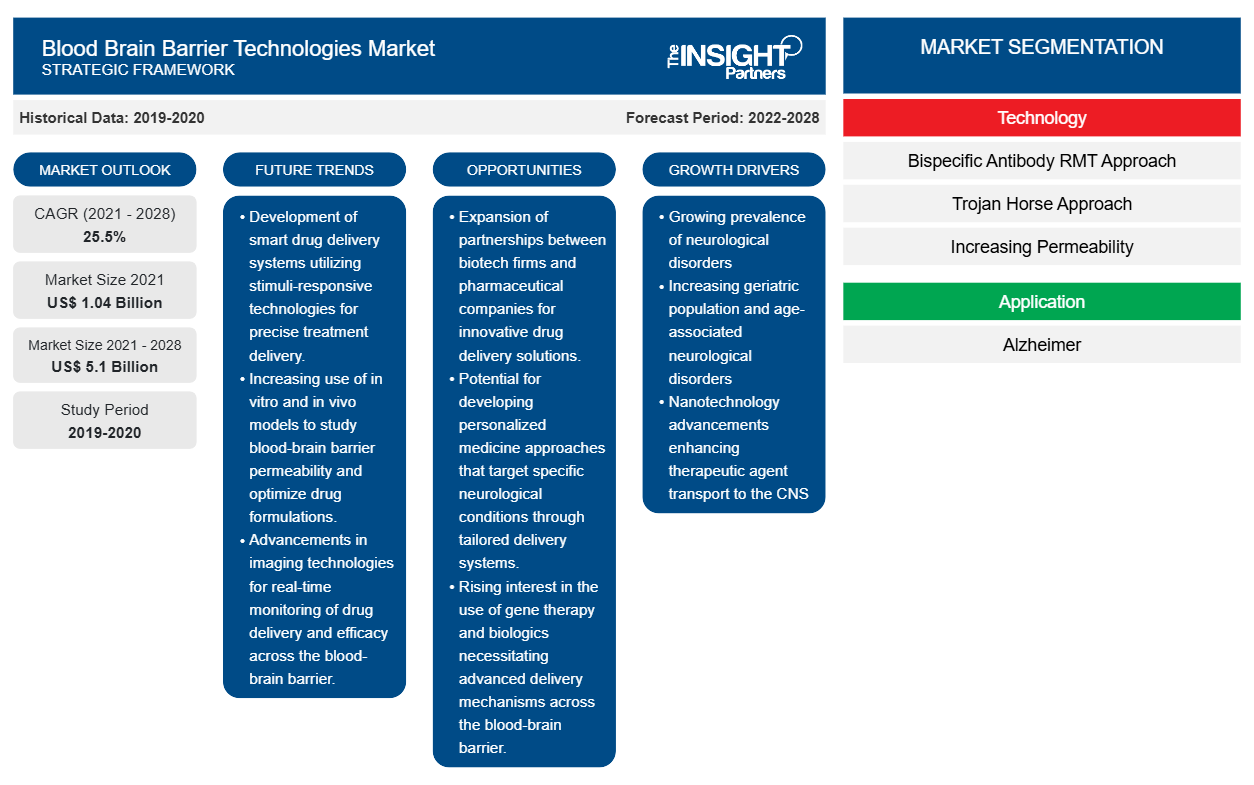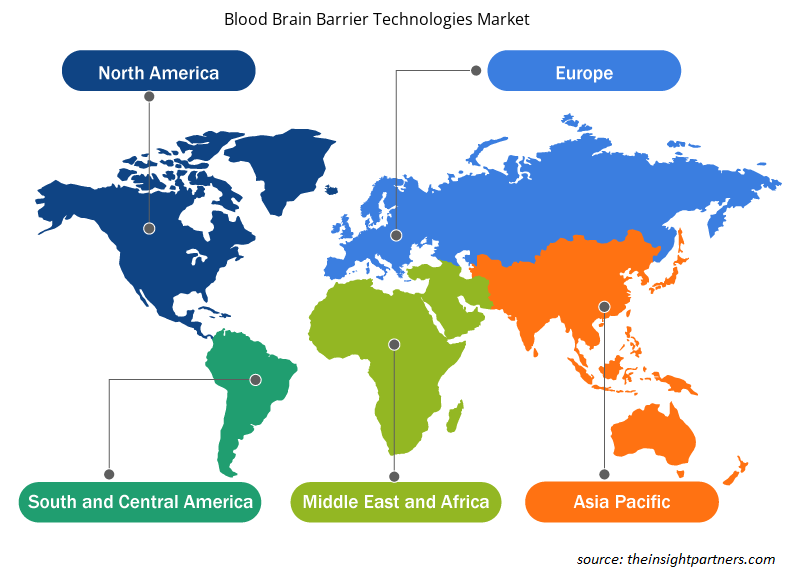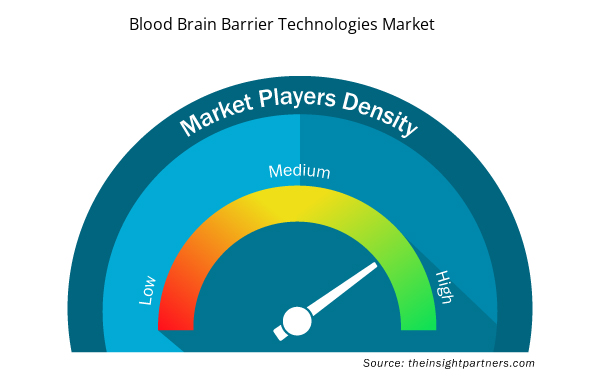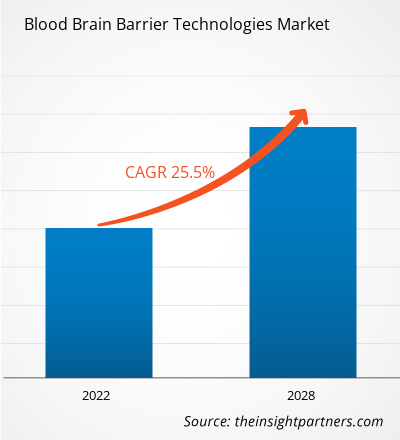The blood brain barrier technologies market is projected to reach US$ 5,101.94 million by 2028 from US$ 1,041.05 million in 2021; it is estimated to register a CAGR of 25.5% from 2021 to 2028.
The brain is surrounded by protective fluid known as cerebrospinal fluid and a protective membrane called the meninges. Blood brain barrier is another protective element present between the brain's blood vessels, and the cells and other components that together make up brain tissue. The blood brain barrier protects the brain against disease-causing pathogens/toxins that may be present in the blood. It blocks the passage of foreign substances entering the brain tissue. It also blocks the passage of life-saving drugs used to treat neurodegeneration and neuroinflammation events. Thus, the technologies used to deliver drugs across blood brain barrier are different than the technologies used to deliver drugs to other body parts.
The blood brain barrier technologies market is segmented on the basis of technology, application, and geography. By geography, the market is further segmented into North America, Europe, Asia Pacific, the Middle East and Africa, and South and Central America. The report offers insights and in-depth analysis of the market, emphasizing parameters such as market trends, technological advancements, and market dynamics, along with the analysis of the competitive landscape of the globally leading market players.
Customize This Report To Suit Your Requirement
You will get customization on any report - free of charge - including parts of this report, or country-level analysis, Excel Data pack, as well as avail great offers and discounts for start-ups & universities
Blood Brain Barrier Technologies Market: Strategic Insights

- Get Top Key Market Trends of this report.This FREE sample will include data analysis, ranging from market trends to estimates and forecasts.
Customize This Report To Suit Your Requirement
You will get customization on any report - free of charge - including parts of this report, or country-level analysis, Excel Data pack, as well as avail great offers and discounts for start-ups & universities
Blood Brain Barrier Technologies Market: Strategic Insights

- Get Top Key Market Trends of this report.This FREE sample will include data analysis, ranging from market trends to estimates and forecasts.
Market Insights
Growing Prevalence of Neurological Disorders Drives Blood Brain Barrier Technologies Market Growth
Neurological disorders such as epilepsy and seizures, Parkinson's disease, dementia, autism, Alzheimer's disease, brain tumors, and cerebral palsy affect the brain and nerves of the human body. The prevalence of neurological disorders is increasing in the US. According to the Centers for Disease Control and Prevention (CDC), Alzheimer's disease is one of the top 10 causes of death in the US. In 2020, Alzheimer's disease affected 5.8 million people in the country. Similarly, as per the estimates of the Parkinson's Foundation Prevalence Project, the US recorded 930,000 cases of Parkinson's Disease in 2020. Additionally, according to the Alzheimer's Association estimates, more than 6 million Americans have Alzheimer's disease, and the number is projected to reach ~13 million by 2050. Moreover, deaths due to Alzheimer's and dementia have increased by 16% in the US since the COVID-19 pandemic. On the other hand, deaths due to Alzheimer's have increased by 145% during 2000–2019.
Epilepsy is a noncommunicable chronic brain disease that affects people of all ages. According to the World Health Organization (WHO), ~50 million people worldwide are suffering from epilepsy, making it one of the most common neurological diseases in the world. ~80% of people with epilepsy live in low- and middle-income countries. The same source estimates that up to 70% of people with epilepsy could live seizure free if they undergo proper diagnosis and treatment. Dementia is currently the seventh-leading cause of death among all diseases, and one of the leading causes of disability and addiction among elderly people worldwide. According to the WHO, more than 55 million people live with dementia worldwide, and there are ~10 million new cases every year. The condition is caused by a variety of diseases and injuries that primarily or secondarily affect the brain. Alzheimer's disease is the most common form of dementia and may contribute to 60–70% of cases. Thus, the growing prevalence of neurological disorders demands advanced blood-brain barrier technologies for the treatment, which is driving the market growth.
Increasing Geriatric Population and Rising Prevalence of Age-Associated Neurological Disorders Contribute to Blood Brain Barrier TechnologiesMarket Growth
Some neurologic disorders such as strokes, neuropathy, Alzheimer's disease, and Parkinson's disease are more common among the elderly populations, and their prevalence is increasing with the elevating life expectancies. According to the WHO, the population is aging rapidly worldwide. During 2015–2050, the world's population of age greater than 60 would nearly double, and its percentage would reach 22% from 12%. Mental and neurological disorders among older adults are likely to account for 6.6% of the total disability-adjusted life year (DALYs) for this age group. Also, as per the same source, ~15% of adults aged 60 and above have a mental disorder.
According to the CDC, Alzheimer's disease is the fifth leading cause of death in people with age 65 and above. Also, the number of people living with Alzheimer's disease doubles every five years. In 2020, Alzheimer's disease affected ~5.8 million Americans belonging to this age group, and by 2060, this number is expected to nearly triple to reach 14 million. The rate of mortalities caused by neurological disorders is also increasing. According to the Alzheimer's Association, 1 in 3 seniors dies with Alzheimer's disease or dementia every year in America.
Therefore, rising prevalence of age-associated neurological disorders is propelling the demand for the blood brain barrier technologies for better drug delivery.
Technology Insights
Based on technology, the global blood brain barrier technologies market is segmented into bispecific antibody RMT approach, trojan horse approach, increasing permeability, passive diffusion, and other noninvasive BBB technologies. In 2020, the increasing permeability segment held the largest share of the market. However, the reagents segment is expected to register the highest CAGR in the market during 2021–2028. Increased blood brain barrier (BBB) permeability is related with the remodeling of interendothelial junctional complex and gap formation between brain endothelial cells (paracellular pathway), and intensive pinocytotic vesicular transport between the apical and basal side of brain endothelial cells (transcellular path). The growth of the market for the increasing permeability segment can be attributed to the rising focus on research activities to treat many neurological and central nervous system disorders.
Application Insights
Based on application, the blood brain barrier technologies market is segmented into Alzheimer’s disease, epilepsy, Parkinson’s disease, multiple sclerosis, Hunter’s syndrome, brain cancer, and others. The Parkinson’s disease segment is expected to hold the largest market share in 2021.
Product launches, and mergers and acquisitions are highly adopted strategies by the players operating in the global blood brain barrier technologies market. A few of the recent key market developments are listed below:
In December 2021, Eli Lilly acquired Prevail Therapeutics, a biotechnology company. Following the deal, Lilly plans to create a gene therapy program for people with neurodegenerative diseases, including Parkinson’s.
In October 2020, Bristol Myers Squibb announced the approval of ZEPOSIA (ozanimod) by Health Canada for the treatment of patients with relapsing-remitting multiple sclerosis (RRMS) to decrease the frequency of clinical exacerbations.
According to a preliminary (yet to be peer-reviewed) research study by four Imperial College London academics, as well as other research-based evidence, the COVID-19 infection might cause neurological problems. This viewpoint developed during the first wave of the pandemic. The blood-brain barrier is a semipermeable membrane of endothelial cells that keeps the brain separated from the components and mechanisms of the rest of the body. Monocytes, a type of white blood cell, are activated as part of the body's defense mechanism when SARS-CoV-2 enters the bloodstream. To allow monocytes to cross the BBB, a complicated mechanism is activated. According to the same study, " blood-brain barrier facilitates the entry of infected and activated monocytes into the central nervous system, allowing the SARS-CoV-2 virus to pass through the loosened BBB. Hence, the rising demand for blood brain barrier technologies to detect neurological problems in COVID-19 patients is positively impacting the market growth.
Blood Brain Barrier Technologies – Market Segmentation
The global blood brain barrier technologies market is segmented into technology, application, and geography. In terms of technology, the market is segmented into bispecific antibody RMT approach, trojan horse approach, increasing permeability, passive diffusion, and other noninvasive BBB technologies. Based on application, the blood brain barrier technologies market is segmented into Alzheimer’s disease, epilepsy, Parkinson’s disease, multiple sclerosis, Hunter’s syndrome, brain cancer, and others.
Blood Brain Barrier Technologies Market Regional Insights
Blood Brain Barrier Technologies Market Regional Insights
The regional trends and factors influencing the Blood Brain Barrier Technologies Market throughout the forecast period have been thoroughly explained by the analysts at Insight Partners. This section also discusses Blood Brain Barrier Technologies Market segments and geography across North America, Europe, Asia Pacific, Middle East and Africa, and South and Central America.

- Get the Regional Specific Data for Blood Brain Barrier Technologies Market
Blood Brain Barrier Technologies Market Report Scope
| Report Attribute | Details |
|---|---|
| Market size in 2021 | US$ 1.04 Billion |
| Market Size by 2028 | US$ 5.1 Billion |
| Global CAGR (2021 - 2028) | 25.5% |
| Historical Data | 2019-2020 |
| Forecast period | 2022-2028 |
| Segments Covered |
By Technology
|
| Regions and Countries Covered | North America
|
| Market leaders and key company profiles |
Blood Brain Barrier Technologies Market Players Density: Understanding Its Impact on Business Dynamics
The Blood Brain Barrier Technologies Market market is growing rapidly, driven by increasing end-user demand due to factors such as evolving consumer preferences, technological advancements, and greater awareness of the product's benefits. As demand rises, businesses are expanding their offerings, innovating to meet consumer needs, and capitalizing on emerging trends, which further fuels market growth.
Market players density refers to the distribution of firms or companies operating within a particular market or industry. It indicates how many competitors (market players) are present in a given market space relative to its size or total market value.
Major Companies operating in the Blood Brain Barrier Technologies Market are:
- Teva Pharmaceutical Industries Ltd.
- F. Hoffmann-La Roche Ltd.
- Eli Lilly and Company
- Bristol-Myers Squibb Company
- Pfizer, Inc.
Disclaimer: The companies listed above are not ranked in any particular order.

- Get the Blood Brain Barrier Technologies Market top key players overview
Company Profiles
- Teva Pharmaceutical Industries Ltd.
- F. Hoffmann-La Roche Ltd.
- Eli Lilly and Company.
- Bristol-Myers Squibb Company
- Pfizer, Inc.
- Johnson and Johnson Services, Inc.
- Fabre-Kramer Pharmaceuticals, Inc.
- Bioasis Technologies Inc.
- Abliva AB
- JCR Pharmaceuticals Co., Ltd.
- Historical Analysis (2 Years), Base Year, Forecast (7 Years) with CAGR
- PEST and SWOT Analysis
- Market Size Value / Volume - Global, Regional, Country
- Industry and Competitive Landscape
- Excel Dataset


- Adaptive Traffic Control System Market
- Cling Films Market
- Constipation Treatment Market
- Advanced Planning and Scheduling Software Market
- Microplate Reader Market
- Gas Engine Market
- Ceramic Injection Molding Market
- Artificial Intelligence in Defense Market
- Asset Integrity Management Market
- Passport Reader Market

Report Coverage
Revenue forecast, Company Analysis, Industry landscape, Growth factors, and Trends

Segment Covered
Technology, Application and Geography

Regional Scope
North America, Europe, Asia Pacific, Middle East & Africa, South & Central America

Country Scope
Argentina, Australia, Brazil, Canada, China, France, Germany, India, Italy, Japan, Mexico, Saudi Arabia, South Africa, South Korea, Spain, United Arab Emirates, United Kingdom, United States
Frequently Asked Questions
Nanoparticles for brain drug delivery is likely to act as trend the market growth in the comping years.
Increasing permeability is the most influencing segment growing in the blood brain barrier technologies market.
Large number of product approvals and launches are likely to fuel the market growth in the comping years.
Key players in the market are Teva Pharmaceutical Industries Ltd., F. Hoffmann-La Roche Ltd., Eli Lilly and Company., Bristol-Myers Squibb Company, Pfizer, Inc., Johnson and Johnson Services, Inc., Fabre-Kramer Pharmaceuticals, Inc., Bioasis Technologies Inc., Abliva AB, and JCR Pharmaceuticals Co., Ltd. among others.
Key factors driving the growth of the market are growing prevalence of neurological disorders and increasing geriatric population and neurological disorders associated with age are among the key factors driving the market.
The brain is surrounded by protective fluid known as cerebrospinal fluid and a protective membrane called the meninges. Similar another protective element is the blood brain barrier. this is a barrier between the brain's blood vessels and the cells and other components that together make up brain tissue. The blood brain barrier protects against disease-causing pathogens/toxins that may be present in the blood. It blocks the passage of foreign substances entering the brain tissue. It also blocks the passage of life-saving drugs used to treat neurodegeneration and neuroinflammation events. Thus, different technologies are used to deliver drugs across blood brain barrier.
Asia-Pacific is the lucrative for the blood brain barrier technologies market.
Trends and growth analysis reports related to Life Sciences : READ MORE..
The List of Companies - Blood Brain Barrier Technologies Market
- Teva Pharmaceutical Industries Ltd.
- F. Hoffmann-La Roche Ltd.
- Eli Lilly and Company
- Bristol-Myers Squibb Company
- Pfizer, Inc.
- Johnson and Johnson Services, Inc.
- Fabre-Kramer Pharmaceuticals, Inc.
- Bioasis Technologies Inc.
- Abliva AB
- JCR Pharmaceuticals Co., Ltd.

 Get Free Sample For
Get Free Sample For